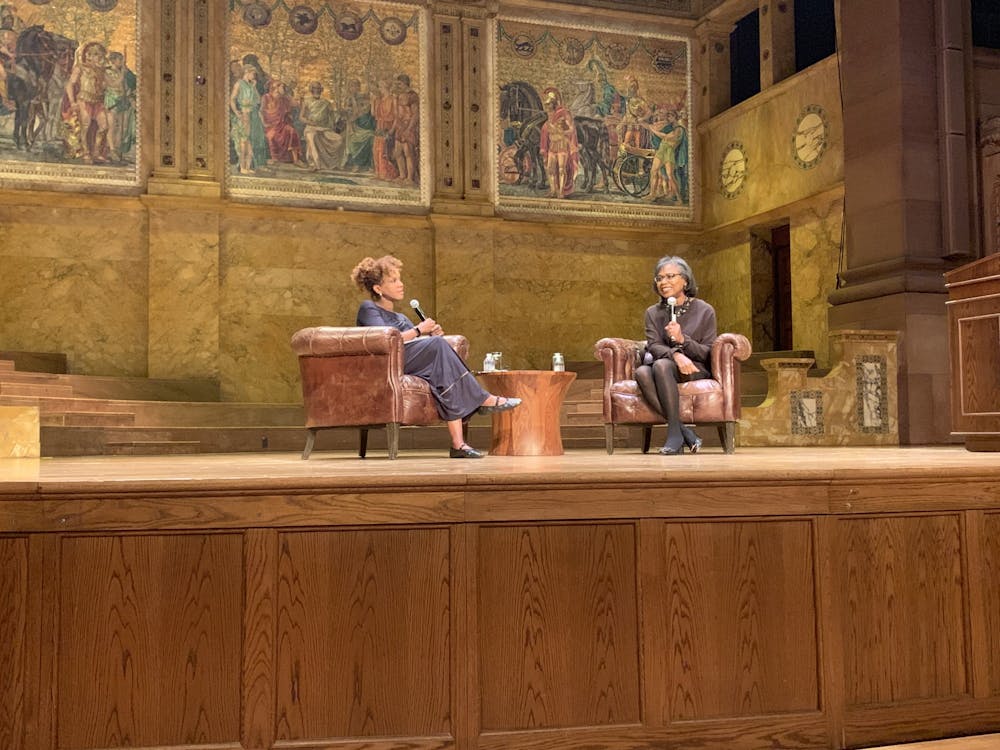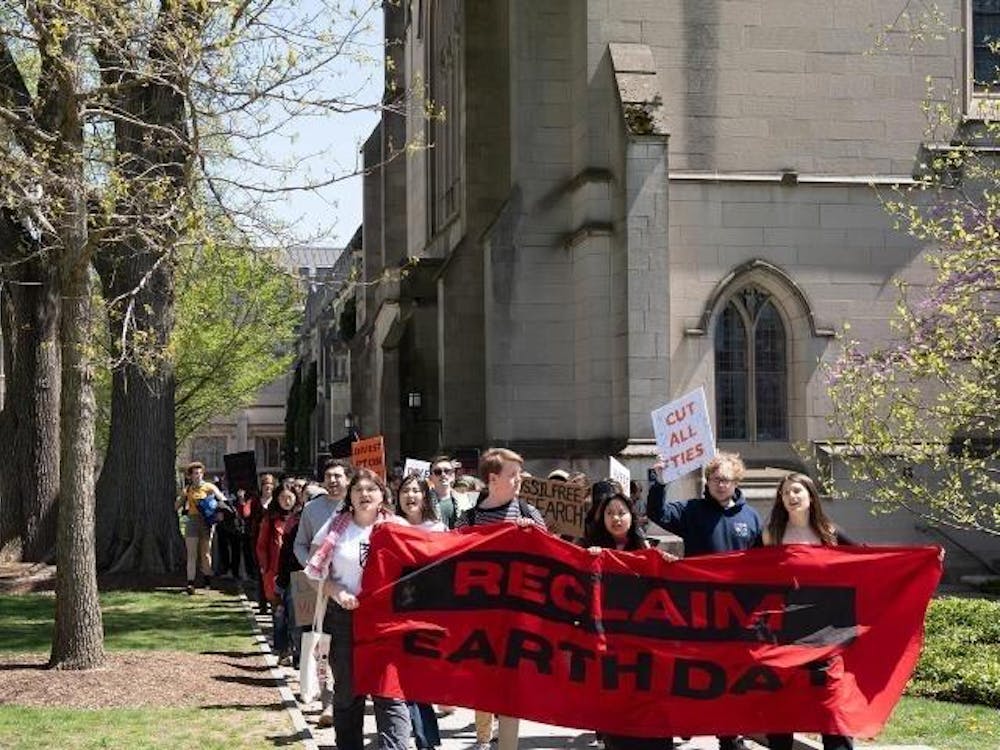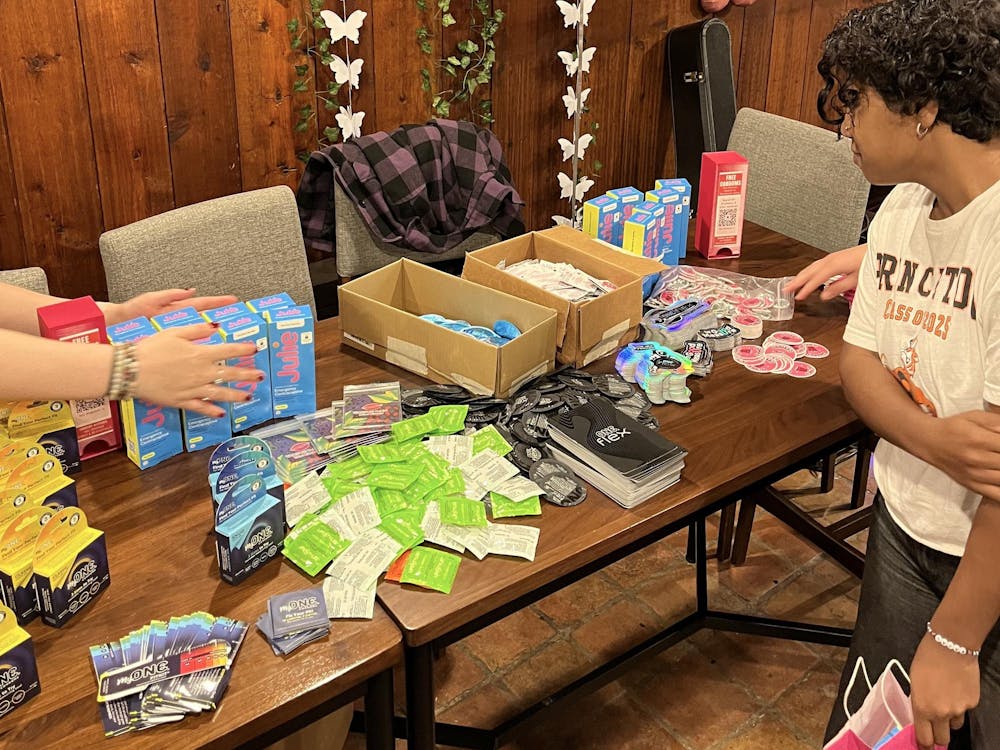Guest speaker Anita Hill joined Imani Perry, the Hughes-Rogers Professor of African American Studies, for a conversation on race, gender, and the law at an evening talk on Thursday, Nov. 14, in a packed Richardson Auditorium.
In 1991, Hill testified before the Senate Judiciary Committee about her allegations of sexual harassment against Supreme Court nominee Clarence Thomas. Though Hill’s testimony gripped the nation, the Senate narrowly confirmed Thomas, who now sits on the Court.
Hill, who holds the title of University Professor of Social Policy, Law, and Women’s and Gender and Sexuality Studies at Brandeis University, walked out on the stage to a full minute of rousing applause. After the crowd had settled down, Perry put the audience’s palpable admiration into a playful first question: “So, how does it feel to be an icon?”
Hill responded by mentioning her “wonderful family,” who keep her “grounded” and remind her “who you’re going to be taking care of.”
Perry went on to ask how the trajectory of Hill’s scholarly work has been shaped by “that moment,” alluding to the 1991 confirmation hearings, during which Hill accused Justice Thomas of sexual harassment.
“The trajectory of my entire life has,” Hill replied.
The two scholars discussed Hill’s 2011 book “Reimagining Equality: Stories of Gender, Race, and Finding Home” at length. Hill explained how her background in commercial and bankruptcy law allowed her to think about the impact of market collapse on communities of color in new ways. As she looked to communities reeling from the 2008 recession, she found that what had been missing from the national discourse was the economic impact on women of color specifically.
“Women of color were more likely to be the home buyers — the sole home buyers — exploited by these bad loans,” she said. “These homes, for these communities, were more than just a place to live,” she argued, noting that home ownership constituted a means of establishing oneself within society.
“Whenever you see a race issue, always look for a gender issue,” Hill said, saying that she always uses this lens to help her law students understand the concept of bias.
Perry added that though first-year law students may find contract law to be their most boring class, she finds the field to be “at the heart of exclusion structures.”
Hill also spoke about one of her personal heroes, Pauli Murray, a black civil rights and women’s rights activist who Hill believes has largely been overlooked by mainstream narratives of those struggles.
Murray developed a theory later employed by Thurgood Marshall to desegregate schools and by Ruth Bader Ginsberg to eliminate workplace discrimination against women, Hill explained.

“She was one of the first to talk about how it feels to not feel like you’re in the right body,” Hill added of Murray. “We didn’t have the word ‘trans,’ but she was the person who was trying to deal intellectually and physically with her own experience of not feeling that she was a binary woman.”
Hill then spoke about the fight against gender violence in the Trump era. She said she had felt hopeful during the inaugural Women’s March, as well as during the #MeToo response to Brett Kavanaugh’s Supreme Court confirmation hearings. Yet she also expressed concern that momentum may have dissipated.
“[The Access Hollywood tape] was this wake-up call,” she said. “And I’m just wondering today … did people wake up? Do they continue to be awake — or woke, as they say — into this election cycle? Will they continue to participate based on those issues? Because they’re not being talked about in the primaries, in the debates.”
The Access Hollywood tape, brought to light by The Washington Post in October 2016, captured Donald Trump, on a hot microphone, in 2005, bragging about groping women.
“When we look at something like the Kavanaugh hearing, and we see echoes of what happened 28 years before, and we realize that our leadership — at least on that particular committee — has not advanced beyond 1991, what does it say about the value of our civic participation and whether or not the government is really ready to address these issues?” Hill continued.
In September 2018, Hill authored a column in The New York Times urging the Senate Judiciary Committee to address accusations of sexual impropriety against Supreme Court nominee Brett Kavanaugh, who was ultimately confirmed, despite the testimony of his accuser, Christine Blasey Ford. Kavanaugh’s confirmation is often compared with Thomas’.
With regard to gender-based violence, Hill said she is most concerned with ensuring that “we don’t lose interest in the system.”
“We need to address these issues as public issues, as opposed to private or personal, or sporadically attending to them one location at a time,” she said. She later added that the press has a role to play, particularly by addressing #MeToo activists as potential voters and highlighting their concerns.
Hill continues to publicly participate in such conversations. In December 2017, she was named chair of the Commission on Sexual Harassment and Advancing Equality in the Workplace, formed to combat sexual harassment across the entertainment industry.
Earlier, in her introduction of the speakers, V. Mitch McEwen, a University professor of architecture and member of the University Public Lectures Committee, which organized and sponsored the event, likened Hill’s work to an architectural project design that may be completed, important, and capable of changing realities, and yet remains unbuilt.
“Professor Hill completed one of the most successful projects in American democracy, though as we know from recent years, it remains largely unbuilt,” McEwen said, going on to describe Hill as someone who has “taught U.S. law to U.S. senators” and sparked a “radical shift in the national understanding of sexual harassment in the workplace.”
Much of the audience agreed, with multiple members expressing during the Q&A portion of the talk that Hill had been a personal hero and inspiration to them for much of their lives.
When asked how she can remain optimistic after Trump was elected, even after the Access Hollywood tape, Hill noted she may not necessarily be “optimistic,” but she is hopeful.
“There are reasons to believe that things can be better. The 2018 elections are one of those reasons,” she said.
“We exposed a kind of ugliness with the election of Donald Trump that we thought didn’t exist or that some didn’t know [about],” she added. “That exposure is worth something.”
Another audience member asked Hill where she stands now with regard to Joe Biden’s presidential campaign. Biden, a leading contender for the 2020 Democratic nomination, was chair of the Senate Judiciary Committee during Thomas’ confirmation hearings in 1991.
“He needs to prove that he should be president. Prove that not only does he regret what happened, but that he takes responsibility for what happened,” Hill responded.
Hill also fielded a question about to whom women should look to be at the forefront of such conversations.
“First of all, we need to start looking at the women running for president. Are they ready to do this?” Hill asked. “They’re not talking directly about these issues of women’s empowerment. One of the reasons, I think, is because they’re not sure the voting population values that conversation. So they’re playing it politically very safe.”
“I am just stumped. You stumped me,” she continued. “Who that individual should be, right now, to inspire women? I don’t know ... Of course, I look at the courts — I think Ruth Bader Ginsberg … If we’re gonna look for inspiration, I think we can start there.”









